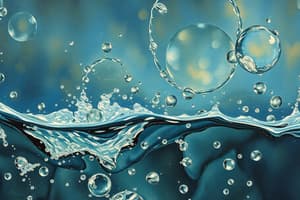Podcast
Questions and Answers
What is the molecular structure of water?
What is the molecular structure of water?
- Three oxygen atoms bonded to a hydrogen atom
- Two oxygen atoms bonded to a hydrogen atom
- One oxygen atom bonded to two hydrogen atoms
- Two hydrogen atoms bonded to an oxygen atom (correct)
What charge does the oxygen atom carry in a water molecule?
What charge does the oxygen atom carry in a water molecule?
- Negative (correct)
- Depends on the temperature
- Neutral
- Positive
Which type of bond creates the polar nature of water molecules?
Which type of bond creates the polar nature of water molecules?
- Dative bond
- Metallic bond
- Covalent bond (correct)
- Ionic bond
What is the basis of hydrogen bonding between water molecules?
What is the basis of hydrogen bonding between water molecules?
Why do water molecules exhibit a polar nature?
Why do water molecules exhibit a polar nature?
What type of interactions are hydrogen bonds between water molecules?
What type of interactions are hydrogen bonds between water molecules?
Why does ice float on the surface of liquid water?
Why does ice float on the surface of liquid water?
What property of water is influenced by the formation of hydrogen bonds?
What property of water is influenced by the formation of hydrogen bonds?
Why does water have a high latent heat of fusion and vaporization compared to similar compounds?
Why does water have a high latent heat of fusion and vaporization compared to similar compounds?
What characteristic allows water to act as an excellent solvent for many compounds?
What characteristic allows water to act as an excellent solvent for many compounds?
How does water's polar nature influence its role in acid-base equilibria?
How does water's polar nature influence its role in acid-base equilibria?
Why is knowledge of water chemistry crucial for developing effective water treatment processes?
Why is knowledge of water chemistry crucial for developing effective water treatment processes?
Flashcards are hidden until you start studying
Study Notes
Water Chemistry: Polar Molecules
Introduction
Understanding water chemistry involves studying the behavior and interactions of water molecules, particularly in relation to polar molecules. Water, with its distinctive properties, plays a crucial role in various aspects of our lives. Its unique characteristics stem from its molecular structure, which consists of two hydrogen atoms bonded to an oxygen atom through covalent bonds. These bonds create a polar molecule, with the oxygen atom possessing a partial negative charge and the hydrogen atoms having a partial positive charge. This polarity leads to several significant properties and behaviors, which are essential for water's role in biological processes and its presence in nature.
Polar Nature and Hydrogen Bonding
Covalent Bonds and Electron Distribution
Water molecules are held together by covalent bonds between the oxygen atom and each hydrogen atom. These covalent bonds create a polar molecule, as the oxygen atom has a higher electronegativity than the hydrogen atoms. This results in a partial negative charge on the oxygen atom and a partial positive charge on each hydrogen atom.
Hydrogen Bonding
The polar nature of water molecules also allows for the formation of hydrogen bonds, which are relatively strong intermolecular interactions. In hydrogen bonding, a hydrogen atom from one molecule is attracted to an electronegative atom (such as oxygen, nitrogen, or fluorine) from another molecule. This bonding mechanism allows water molecules to form an extensive three-dimensional network, contributing to its unique properties and behaviors.
Physical Properties of Water
Density and Specific Gravity
Water has a unique density, with solid water (ice) being less dense than liquid water. This property is essential for the presence of ice floats on the surface of liquid water, preventing the ice from sinking and insulating the water below.
Surface Tension and Viscosity
Water molecules have a dipole moment, reflecting their polarity. This polarity allows for the formation of hydrogen bonds, which influence the surface tension and viscosity of water.
Latent Heat of Fusion and Vaporization
Water has a higher latent heat of fusion (80 cal) and vaporization (540 cal) compared to other compounds with similar molecular structures. These high latent heats are due to the extensive hydrogen bonding network in water.
Chemical Properties of Water
Solubility and Reactivity
Water is an excellent solvent for many ionic compounds and hydrogen-bonding molecules. Its polar nature allows for the formation of hydrates, which can have significant industrial and scientific applications.
pH and Acid-Base Equilibria
Water can act as both an acid and a base, and its chemical properties play a crucial role in acid-base equilibria. The pH of a solution can be influenced by the presence of hydrogen ions (H+) or hydronium ions (H3O+).
Environmental and Health Implications
Water Pollution and Health Risks
Understanding water chemistry is essential for addressing water pollution and related health risks. Contaminants, such as per- and polyfluoroalkyl substances (PFAS), can have adverse effects on human health, particularly in relation to water quality and access.
Water Treatment and Wastewater Management
Knowledge of water chemistry is crucial for developing effective water treatment processes and managing wastewater systems, as these processes rely on understanding the physical and chemical properties of water.
Conclusion
The study of water chemistry, with a focus on polar molecules, provides valuable insights into the unique properties and behaviors of water. This understanding is essential for addressing various environmental, health, and industrial challenges related to water. As water continues to be a critical resource for human life and sustainable development, ongoing research and advancements in water chemistry will be vital for addressing the complex and interconnected challenges of the future.
Studying That Suits You
Use AI to generate personalized quizzes and flashcards to suit your learning preferences.





